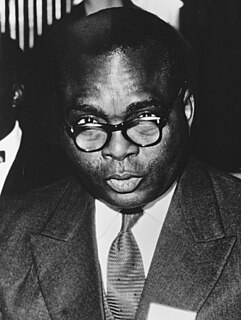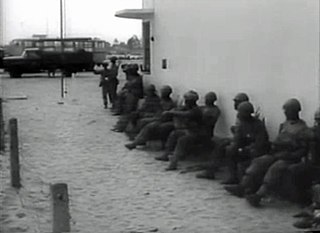Related Research Articles

Évariste Leon Kimba Mutombo was a Congolese journalist and politician who served as Foreign Minister of the State of Katanga from 1960 to 1963 and Prime Minister of the Democratic Republic of the Congo from 13 October to 25 November 1965. Kimba was born in 1926 in Katanga Province, Belgian Congo. Following the completion of his studies he worked as a journalist and became editor-in-chief of the Essor du Congo. In 1958 he and a group of Katangese concerned about domination of their province by people from the neighbouring Kasaï region founded the Confédération des associations tribales du Katanga (CONAKAT), a regionalist political party. In 1960 the Congo became independent and shortly thereafter Moise Tshombe declared the secession of the State of Katanga. Kimba played an active role in the separatist state's government as its Minister of Foreign Affairs and participated in numerous talks with the central government aimed at political reconciliation. Following the collapse of the secession in early 1963, Kimba had a falling out with Tshombe and took up several ministerial posts in the new province of South Katanga.

Jean Bolikango, later Bolikango Akpolokaka Gbukulu Nzete Nzube, was a Congolese educator, writer, and conservative politician. He served twice as Deputy Prime Minister of the Republic of the Congo, in September 1960 and from February to August 1962. Enjoying substantial popularity among the Bangala people, he headed the Parti de l'Unité Nationale and worked as a key opposition member in Parliament in the early 1960s.
Joseph-Georges Kasongo was a Tanganyikan-born Congolese lawyer, businessman, and politician who served as the first President of the Chamber of Deputies of the Republic of the Congo. He later held office as a deputy prime minister and as a senator.

The Free Republic of the Congo, often referred to as Congo-Stanleyville, was a short-lived rival government to the Republic of the Congo (Congo-Léopoldville) based in the eastern Congo and led by Antoine Gizenga.

Jason Sendwe was a Congolese politician and a leader of the Association Générale des Baluba du Katanga (BALUBAKAT) party. He served as Second Deputy Prime Minister of the Democratic Republic of the Congo from August 1961 until January 1963, and as President of the Province of North Katanga from September 1963 until his death, with a brief interruption.
Maurice Mpolo was a Congolese politician who served as Minister of Youth and Sports of the Republic of the Congo in 1960. He briefly led the Congolese army that July. He was executed alongside Prime Minister Patrice Lumumba in Katanga in 1961.
Alphonse Songolo was a Congolese politician who served as the Republic of the Congo (Léopoldville)'s first Minister of Communications. He was a prominent member of the Mouvement National Congolais in Stanleyville and a close partner of Patrice Lumumba. However, in October 1960 he denounced Lumumba and was shortly thereafter imprisoned by pro-Lumumba authorities. He was executed in February 1961 in retaliation for the deaths of several pro-Lumumba politicians.

The Lumumba Government, also known as the Lumumba Ministry or Lumumba Cabinet, was the first set of ministers, ministers of state, and secretaries of state that governed the Democratic Republic of the Congo under the leadership of Prime Minister Patrice Lumumba from 24 June until 12 September 1960. The government inherited many problems from the era of the Belgian Congo, a tightly administered colony which for most of its existence had few political freedoms. Its members came from different social classes, different tribes, and held varied political beliefs. Weak and divided, its tenure was dominated by a widespread mutiny in the army and two secessions. An exodus of thousands of Belgian functionaries—who had controlled most of the bureaucracy—left the administration in disarray. The United Nations created a large multinational peacekeeping force to assist the government in reestablishing law and order. Western nations were under the impression that Lumumba was a communist, and the United States, Belgium, and France all worked to undermine and divide his government. Domestic opposition to the government cemented by late July, and Lumumba increasingly relied on only a few advisers, and rarely consulted the full Council of Ministers; several members of the government began acting without his direction. He resorted to increasingly authoritarian measures to maintain control over the country.

Mario-Philippe Losembe Batwanyele is a Congolese politician and diplomat. He is currently serving as the second vice president of the Senate of the Democratic Republic of the Congo.

Victor Koumorico was a Congolese politician who served as President of the Senate of the Democratic Republic of the Congo from July 1961 until November 1962.
Jean-Chrysostome Weregemere or Weregemere Bingwa Nyalumeke was a Congolese politician who led a faction of the Centre du Regroupement Africain. He served as Minister of Agriculture in the Congolese government from August 1961 until July 1962 and then as Minister of Justice until December 1962. Weregemere later held prominent positions in parastatals and sat on the central committee of the Mouvement Populaire de la Révolution from 1980 until 1985.
Rémy Mwamba (1921–1967) was a Congolese politician who twice served as Minister of Justice of the Democratic Republic of the Congo. He was also a leading figure of the Association Générale des Baluba du Katanga (BALUBAKAT).
Barthélemy Mukenge Nsumpi Shabantu was a Congolese politician who served as President of Kasaï Province from 11 June 1960 to January 1962 and July to September 1962. He was a president of the Association des Lulua-Frères, a Lulua ethnic syndicate, and a leading member of the Union National Congolaise. Though initially allied with nationalist Patrice Lumumba, he later denounced him and aligned himself with more moderate politicians. Following the division of Kasai Province in late 1962, Mukenge became Minister of Health and Minister of Social Affairs of the new Luluabourg Province. He later served as Governor of Kivu Province and on the Political Bureau of the Mouvement Populaire de la Révolution. He withdrew from politics in 1974 and died in 2018.

Marcel Bisukiro Tabaro wa Kamonyi was a Congolese journalist and politician. He was a leading member of the Centre du Regroupement Africain and served twice as Minister of External Commerce of the Democratic Republic of the Congo from June until September 1960 and from August 1961 until April 1962.

On 5 July 1960, soldiers of the garrisons of Léopoldville and Thysville of the Force Publique, the army of the newly independent Republic of the Congo mutinied against their white officers. The revolt quickly spread throughout the Bas-Congo and engulfed the country in disorder, beginning the Congo Crisis.
Joseph Bonaventure Lutula La Puku Pene Omasumbu was a Congolese politician who served as Minister of Agriculture of the Democratic Republic of the Congo in 1960. He reassumed the post in 1961 and held it until April 1963, when he was appointed Minister of Middle Classes and Community Development. He resigned from the government that September. He died in 2008.

Jean-Pierre Finant was a Congolese politician who served as the first President of Orientale Province in the Democratic Republic of the Congo from June until October 1960.
Aloïs Kabangi Kaumbu was a Congolese politician. He served as Minister of Economic Coordination and Planning of the Republic of the Congo from June to September 1960 and again from February 1961 to July 1962.

The Lumumba Government was the first set of ministers, ministers of state, and secretaries of state that governed the Democratic Republic of the Congo under the leadership of Prime Minister Patrice Lumumba from 24 June until 12 September 1960. It was hastily formed over the period of several weeks in June, and was supported by a slight majority coalition in Parliament. Weak and divided, its tenure was dominated by a widespread mutiny in the army and two secessions.
In August 1960 troops of the Republic of the Congo attempted to crush the secession of South Kasai by invading the declared state's territory. Though initially militarily successful, the attack faltered under intense international and domestic political scrutiny and the Congolese troops were withdrawn.
References
- Gaviola, Carlos A. (1968). Misión en el Congo: dos años con la UN en Kiw (in Spanish). Buenos Aires: Kraft. OCLC 912150961.
- Hoskyns, Catherine (1965). The Congo Since Independence: January 1960 – December 1961. London: Oxford University Press. OCLC 414961.
- Kisonga Mazakala, Albert (2005). 45 ans d'histoire congolaise: l'expérience d'un lumumbiste (in French). Paris: L'Harmattan. ISBN 9782747590204.
- Nelson, Jack E. (1992). Christian Missionizing and Social Transformation: A History of Conflict and Change in Eastern Zaire (illustrated ed.). Greenwood Publishing Group. ISBN 978-0-275-94246-5.
- Omasombo Tshonda, Jean, ed. (2011). Maniema : Espace et vies (PDF). Provinces (in French). Tervuren: Musée royal de l’Afrique centrale. ISBN 978-2-8710-6562-3.
- Onana, Charles (2009). Ces tueurs tutsi: au coeur de la tragédie congolaise (in French). Paris: Duboiris. ISBN 9782916872087.
- Verhaegen, Benoît (1966). Rébellions au Congo (in French). Vol. 2. Brussels: Centre de recherche et d'information socio-politiques. OCLC 958205586.
- Young, Crawford (1965). Politics in the Congo: Decolonization and Independence. Princeton: Princeton University Press. OCLC 307971.